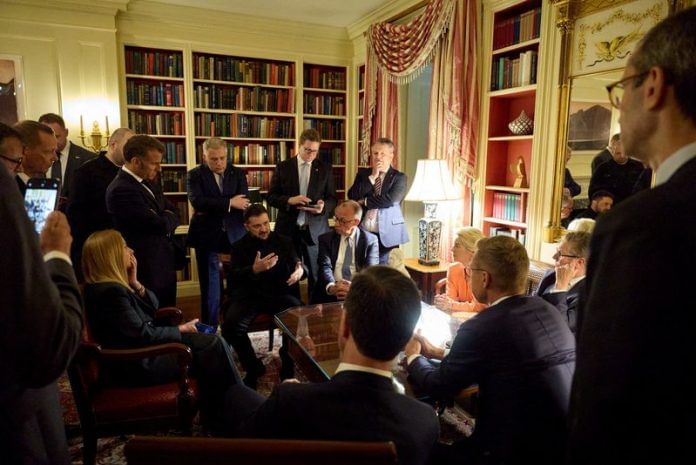By Andrea Shalal, Tom Balmforth and Anastasiia Malenko
WASHINGTON/LONDON/KYIV (Reuters) -U.S. President Donald Trump said on Tuesday he hoped Russia’s Vladimir Putin would move forward on ending the war in Ukraine but conceded that the Kremlin leader may not want to make a deal at all, adding this would create a “rough situation” for Putin.
In an interview with the Fox News “Fox & Friends” programme, Trump said he expected that Putin’s course of action would become clear in the next couple of weeks. Trump also again ruled out American boots on the ground in Ukraine and gave no specifics about the security guarantees he has previously said Washington could offer Kyiv under any post-war settlement.
“I don’t think it’s going to be a problem (reaching a peace deal), to be honest with you. I think Putin is tired of it. I think they’re all tired of it, but you never know,” Trump said.
“We’re going to find out about President Putin in the next couple of weeks … It’s possible that he doesn’t want to make a deal,” said Trump, who has previously threatened more sanctions on Russia and nations that buy its oil if Putin does not make peace.
Ukraine and its European allies have been buoyed by Trump’s promise of security guarantees to help end the war during an extraordinary summit on Monday but face many unanswered questions, including how willing Russia will be to play ball.
Ukrainian President Volodymyr Zelenskiy hailed Monday’s talks at the White House with the U.S. president as a “major step forward” towards ending Europe’s deadliest conflict in 80 years and towards setting up a trilateral meeting with Putin and Trump in the coming weeks.
Zelenskiy was flanked by the leaders of allies including Germany, France and Britain at the summit and his warm rapport with Trump contrasted sharply with their disastrous Oval Office meeting in February.
But beyond the optics, the path to peace remains deeply uncertain and Zelenskiy may be forced to make painful compromises to end the war, which began with Russia’s full-scale invasion in February 2022. Analysts say more than 1 million people have been killed or wounded in the conflict.
While the Washington talks allowed for a temporary sense of relief in Kyiv, there was no let-up in the fighting. Russia launched 270 drones and 10 missiles in an overnight attack on Ukraine, the Ukrainian air force said, the largest this month. The energy ministry said Russia had targeted energy facilities in the central Poltava region, home to Ukraine’s only oil refinery, causing big fires.
“The good news is that there was no blow-up (at the White House). Trump didn’t demand Ukrainian capitulation nor cut off support. The mood music was positive and the trans-Atlantic alliance lives on,” John Foreman, a former British defence attache to Kyiv and Moscow, told Reuters.
“On the downside, there is a great deal of uncertainty about the nature of security guarantees and what exactly the U.S. has in mind.”
Ukraine’s allies were to hold talks in the so-called “Coalition of the Willing” format on Tuesday to discuss the way forward. NATO chiefs of defence will also discuss security guarantees for Ukraine on Tuesday, a source close to the matter said, without mentioning further details.
‘DOESN’T SMELL LIKE PEACE’
Russia has made no explicit commitment to a meeting between Putin and Zelenskiy. Foreign Minister Sergei Lavrov said on Tuesday that Moscow did not reject any formats for discussing the peace process in Ukraine but any meeting of national leaders “must be prepared with utmost thoroughness”.
“It doesn’t smell like peace yet. I think Putin will not go for it, he is not that kind of person,” said a 63-year-old resident of Kyiv, Oksana Melnyk. “I really wanted it all to end peacefully, but, unfortunately, a lot of our people died and it is very bitter.”
Putin has warned that Russia will not tolerate troops from the NATO alliance on Ukrainian soil. He has also shown no sign of backing down from demands for territory, including land not under Russia’s military control, following his summit talks with Trump last Friday in Alaska.
Trump has not specified what form any U.S. security guarantees could take. In Alaska he backed away from insisting that Russia agree to a ceasefire before any peace negotiations kick off in earnest.
Neil Melvin, director, International Security at the Royal United Services Institute think-tank, said Russia could drag out the war while trying to deflect U.S. pressure with a protracted peace negotiation.
“I think behind this there’s a struggle going on between Ukraine and the Europeans on one side, and the Russians on the other, not to present themselves to Trump as the obstacle to his peace process.”
“They’re all tiptoeing around Trump” to avoid any blame, he said, adding that on security guarantees, “the problem is that what Trump has said is so vague it’s very hard to take it seriously”.
(Reporting by Tom Balmforth, Elizabeth Piper, Matthias Williams, Anastasiia Malenko, Rachel More, Madeline Chambers, Sabine Siebold, Susan Heavey, Andrea ShalalWriting by Matthias WilliamsEditing by Gareth Jones and Frances Kerry)
Disclaimer: This report is auto generated from the Reuters news service. ThePrint holds no responsibility for its content.




